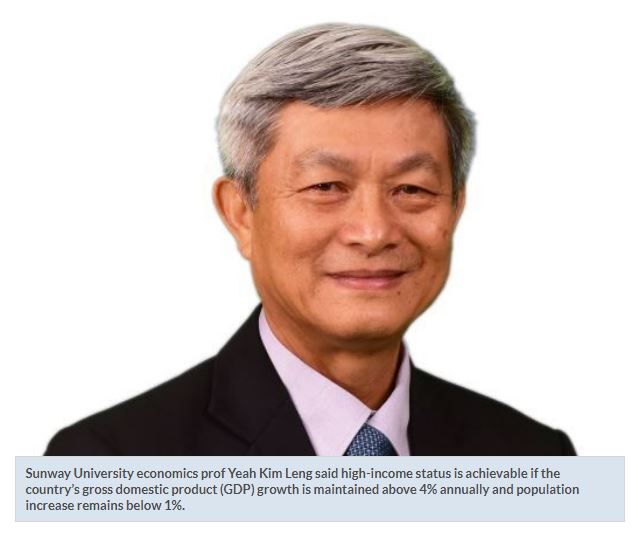Malaysia: Conditions for achieving a high-income nation possible, say economists
KUALA LUMPUR: While economists agree that Malaysia is on track to become a high-income nation by 2026 if economic growth stays above 4% over the next three years, there remain critical challenges such income inequality, attracting more private investments and ensuring that inflation and currency issues are dealt with.
Sunway University economics prof Yeah Kim Leng said the high-income status is achievable if the country’s gross domestic product (GDP) growth is maintained above 4% annually and population increase remains below 1%.
“The resulting per capita income growth of around 3% will enable the country’s per capita income level to rise above the projected high income threshold, as defined by the World Bank,” Yeah told StarBiz.
Yeah pointed out that besides growth, “the country’s inflation and currency also need to perform well against the global average.”
On Wednesday, Economy Minister Rafizi Ramli had said the country would cross the high income threshold by 2026 if its growth rate remains above 4% over the next three years.
Rafizi added that the unity government’s top priority now is to roll out policies that would raise salaries, including the possibility of introducing a national wage growth policy.
He said the revised Budget 2023, due to be tabled on Feb 24, would focus on programmes to help raise wages, especially for the hardcore poor and Bottom 40 households.
Malaysia University of Science and Technology economics professor Geoffrey Williams said the high-income target from the World Bank is meaningless in terms of economic policy, because it is “just its metric for which countries qualify for its help and the type of help they would get.”
“Malaysia should develop its own ideas about quality of life, the decent level of income and how this can be achieved,” he said.
Williams pointed out that the high-income target was set by former prime minister Datuk Seri Najib Razak in 2010 in the 10th Malaysia Plan (10MP).
“We said at the time that the target would not be met by 2020. The challenge is that there are many issues that arise outside of the government’s control which will hamper the growth trajectory.
“Secondly, the 10MP also had a target to produce three million extra jobs, two-thirds of which would not require high-skills. So, that has been successful but as a consequence we now have a low-income economy,” he said.
Bank Islam Malaysia Bhd chief economist Firdaos Rosli said the government should outline a clear capital formation strategy to improve future growth, if it embarks on a debt-driven growth strategy to achieve a high-income nation status.
“Achieving a high-income nation status is the destination, but what about the journey? Is it going to be debt or income-led growth? If it is the latter (income-led growth), the government may have to pursue nominal GDP targeting, which may impact how we view inflation and rising prices,” he said.
According to Firdaos, the government needs to outline its plans for a high-income economy.
“Would the economy be consumption or industrial development driven?,” he asked.
Centre for Market Education CEO Carmelo Ferlito pointed out that “Malaysia’s economic growth is terribly unbalanced on consumption, which means that the cake is eaten rather than enlarged.”
He said investments have been lacking, and in the past decade, they have strongly been on a decline.
Investments are just 20% of the GDP now (4.5% government investments and 15.5% private investments), noted Ferlito.
“Instead in Indonesia, investments remain stably above 30% of GDP. This is the key for building a path to sustainable growth –strengthening investments rather than consumption,” he said.
On reducing income inequality in the country, Yeah said without growth, closing the income gap would be much harder to achieve as it entails taking wealth from the rich and redistributing to the poor.
“Not only will the distributive policies undermine the foundation of a free market economy but it could worsen inequalities,” he explained.
Yeah noted that the government must strike a balance between growth and equity, especially in crafting complementary policies that support growth and reduce inequalities simultaneously.
“For instance, promoting growth and development in less-developed states will lift national growth while reducing regional disparities and income inequality between states,” he said.
On reducing income inequality, Firdaos said it would depend on the government’s fiscal priorities.
“I think this will be made clearer as we inch closer to the unveiling of the 12th Malaysia Plan mid-term review (expected in September),” he said.
Williams also noted that reducing income inequality is essential.
“This is more important than the per-capita level. Inequality is essential to tackle as will be access to health, education and quality of life overall, across all demographic categories,” he said.
On reducing income inequality, Ferlito said it would be a perilous path, if forcing equality by law means treating people unfairly.
“The key should not be to promote equality, but to promote social mobility. And a key factor is to promote capital concentration, moving away from a capitalism based on micro-businesses and favouring industrial concentration,” he said.
On a national wage growth policy, Yeah said while it is a laudable suggestion, such a policy should be based on productivity increases, shift to higher value activities and rise in competitiveness.
“Rising wages driven by rising demand, skills and productivity and other market forces are more sustainable and reflective of a dynamic and efficient economy. Mandated wage increases run the risk of misalignment with changing market conditions, resulting in business closures, bankruptcies and layoffs as well as declining investment in a downward spiral of the economy,” he explained.
Yeah added that a focus on enhancing the transparency and efficiency of labour market information systems, productivity-linked wage systems, increasing labour mobility, curbing labour exploitation and excessive executives compensation are policy initiatives that are in the right direction of fair, flexible and competitive wages to arrest the decline in the labour share of income.
Source: https://www.thestar.com.my/business/business-news/2023/02/17/conditions-for-achieving-a-high-income-nation-possible-say-economists


 English
English




